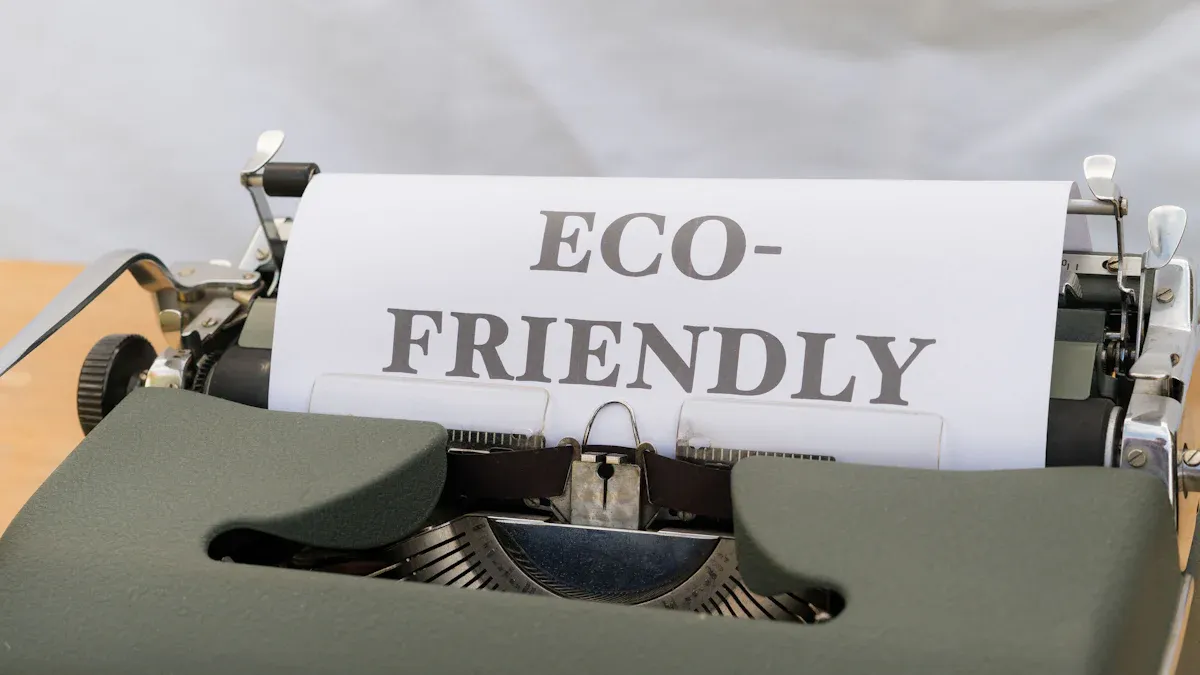Why small businesses can’t afford to Ignore environmental certifications

Sustainability is no longer optional for small businesses. Consumers today actively seek eco-friendly options, and environmental certification has become a business imperative. It builds trust, ensures compliance, and helps you achieve sustainability goals. Certified businesses often experience higher revenue growth by attracting loyal customers who value transparency. Certification also protects against greenwashing accusations and positions your business as a leader in sustainable small business competitiveness. By embracing certifications, you can reduce costs, improve efficiency, and stand out in a crowded market.
Key takeaways
Environmental certifications help build trust with customers and investors. They show you care about the environment and attract loyal buyers who like green practices.
Certifications can save money. Using eco-friendly methods often cuts energy use and waste, which lowers costs over time.
Skipping certifications can hurt your business. More people now choose companies that care about the planet. Without certifications, you might lose chances to grow.
Working with others on sustainability improves teamwork. Include workers, customers, and suppliers to get ideas and create a green culture.
Share your certifications well. Show them clearly in ads to draw eco-friendly buyers and make your brand more trustworthy.
Understanding environmental certifications
What are environmental certifications?
Environmental certifications are formal recognitions that validate your business's commitment to sustainability and environmental responsibility. These certifications assess your operations, products, or services against established sustainability reporting standards. They ensure you meet specific criteria for environmental protection, ethical practices, and resource efficiency.
Some widely recognized certifications include:
Certified B Corporation: Recognizes businesses excelling in social and environmental performance.
ISO 14001: Focuses on environmental management systems and compliance with legal obligations.
Cradle to Cradle Certified: Ensures products are safe, circular, and responsibly made.
Fairtrade Standard: Promotes ethical sourcing and environmental responsibility.
By obtaining these certifications, you demonstrate your dedication to sustainability and align with global sustainability reporting standards.
Why they matter for small businesses
For small businesses, environmental certifications are more than just a badge of honor. They are a strategic tool to build trust with customers, investors, and stakeholders. Certifications show that you prioritize sustainability and environmental protection, which resonates with eco-conscious consumers.
Moreover, certifications like ISO 14001 help you streamline operations, reduce waste, and comply with regulations. This not only saves costs but also enhances your reputation. Investors increasingly favor businesses with strong sustainability credentials, making certifications a valuable asset for attracting funding and partnerships.
The role of sustainability in today’s market
Sustainability has become a driving force in consumer behavior and market trends. Customers now prefer brands that offer sustainable goods and demonstrate environmental responsibility. This shift is no longer a niche concern but a mainstream expectation.
Businesses that adopt sustainability reporting standards and eco-friendly practices gain a competitive edge. For example, reusable packaging and plant-based products are in high demand, reflecting evolving consumer values. By aligning with these trends, you position your business as a leader in sustainability, attracting loyal customers and forward-thinking investors.
"As a B Corp company, we inherently and actively prioritize sustainability – something that we, as well as our customers and shareholders, value." This statement highlights how certifications not only validate your efforts but also enhance your credibility in the eyes of your audience.
Benefits of environmental certifications for small businesses

Cost savings and operational efficiency
Environmental certifications can help you save money while improving how your business operates. These certifications often require you to adopt sustainable practices, such as reducing energy consumption, minimizing waste, and optimizing resource use. By implementing these changes, you can lower utility bills and cut unnecessary expenses. For example, switching to energy-efficient equipment or using renewable energy sources can significantly reduce operating costs over time.
Streamlining your processes to meet certification standards also boosts efficiency. You’ll identify areas where resources are wasted and find ways to improve. This not only saves money but also makes your business more resilient. Sustainable operations often lead to long-term cost savings, giving you more room to invest in growth and innovation.
Building customer trust and loyalty
Consumers today want to support businesses that care about the planet. Environmental certifications act as proof of your commitment to sustainability. They show your customers that you’re serious about protecting the environment and adopting eco-friendly practices. This transparency builds trust and encourages customer loyalty.
Green certifications serve as credible benchmarks that validate your efforts. As more people prioritize sustainability in their purchasing decisions, having these certifications can set you apart. Customers are more likely to choose your products or services over competitors who lack such credentials. By demonstrating genuine dedication to sustainable practices, you create a loyal customer base that values your brand.
Ensuring regulatory compliance
Staying compliant with environmental regulations is crucial for small businesses. Certifications like ISO 14001 help you meet legal requirements by guiding you through the process of creating an effective environmental management system. This ensures you stay ahead of changing laws and avoid costly penalties.
Regulatory compliance also protects your reputation. When you follow the rules and adopt sustainable practices, you show stakeholders that your business operates responsibly. This not only reduces risks but also enhances your credibility in the market. By achieving certifications, you ensure your business remains compliant while contributing to a more sustainable future.
Gaining a competitive edge
Environmental certifications give you a powerful competitive edge in today’s sustainability-driven market. They set your business apart by showcasing your commitment to eco-friendly practices. When customers see your certifications, they know you prioritize sustainability. This builds trust and positions your brand as a leader in responsible business practices.
Certifications also help you stand out from competitors who lack them. Many businesses claim to be sustainable, but certifications provide proof. They validate your efforts and show that you meet high standards. This credibility attracts customers who value transparency and environmental responsibility. It also helps you win over investors and partners who prioritize sustainability.
By adopting certifications, you can also improve your operations. Sustainable practices often lead to better efficiency and lower costs. This allows you to offer competitive pricing without compromising quality. As a result, you gain a competitive advantage that strengthens your position in the market.
Expanding market opportunities
Environmental certifications open doors to new market opportunities. Many industries now require businesses to meet sustainability standards. By obtaining certifications, you can access these markets and expand your reach. For example, certified businesses are often preferred suppliers for government contracts and large corporations.
The growing demand for sustainable products and services also creates opportunities. Consumers increasingly choose brands that align with their values. Certifications help you tap into this trend and attract eco-conscious customers. They also allow you to explore international markets where sustainability is a priority.
The environment testing, inspection, and certification market is growing rapidly. This growth is driven by stricter regulations and rising public concern for sustainability. Small businesses with certifications can capitalize on this trend. They can offer services that help other companies comply with environmental standards. This creates a win-win situation where you contribute to sustainability while growing your business.
Tip: Use your certifications as a marketing tool. Highlight them in your branding and communications to attract more customers and partners.
Risks of ignoring environmental certifications
Losing sustainable small business competitiveness
Ignoring environmental certifications can severely harm your ability to compete in today’s market. Consumers increasingly prefer businesses that prioritize sustainability. Without certifications, your business risks being overlooked by eco-conscious customers who demand transparency and accountability. This can lead to declining sales and reduced market share.
Sustainability-conscious companies often enjoy better financial success, lower operating costs, and higher employee retention rates. They also build a positive public image, which attracts loyal customers and investors. On the other hand, businesses that ignore sustainability may face reputational damage, consumer backlash, and even legal liabilities. These factors can significantly weaken your position in the market.
Evidence Type | Description |
|---|---|
Financial Success | Sustainability-conscious companies experience better long-term financial success. |
Resilience | These companies are more resilient to changing environments and consumer values. |
Operating Costs | They have lower operating costs compared to those ignoring sustainability. |
Employee Retention | Higher employee retention rates are observed in sustainable businesses. |
Public Image | A positive public image is associated with sustainable practices. |
Facing regulatory penalties
Failing to obtain environmental certifications can expose your business to costly regulatory penalties. Governments worldwide are tightening environmental laws, and non-compliance can result in significant fines. For small businesses, these penalties can create financial strain and disrupt operations.
Many small businesses lack the expertise to manage environmental compliance effectively. This increases the risk of violations, which can lead to catastrophic outcomes for both your business and the environment. Regulatory penalties not only drain your resources but also damage your reputation. Customers and stakeholders may lose trust in your brand, further impacting your growth.
Risk Type | Consequence |
|---|---|
Legal Penalties | Non-compliance can lead to significant fines. |
Financial Strain | Costs associated with penalties can burden small businesses. |
Reputational Damage | Negative public perception can affect market position. |
Damaging brand reputation
Your brand’s reputation is one of its most valuable assets. Ignoring environmental certifications can tarnish this reputation, especially as consumers increasingly value sustainability. Interest in ethical brands surged by 300% in recent years, reflecting a growing demand for businesses that align with sustainable practices.
Failing to meet these expectations can lead to reputational risks. Studies show that environmental, social, and governance (ESG) issues are among the top five risks affecting businesses today. Companies without robust sustainability practices often struggle to manage these risks, leading to negative public perception. This can result in lost customers, reduced investor confidence, and long-term damage to your brand.
Note: Only 17% of businesses have strong governance processes for managing ESG risks. Don’t let your business fall behind. Embracing certifications can protect your reputation and secure your future.
Missing cost-saving opportunities
Ignoring environmental certifications means you could miss out on significant cost-saving opportunities. Many small businesses fail to realize how adopting sustainable practices can directly impact their bottom line. By not pursuing certifications, you may overlook simple changes that could save money and improve efficiency.
For example, energy efficiency measures can drastically reduce operating costs. A specific case showed that implementing such measures led to a 65% reduction in carbon emissions and a 40% cut in electricity expenses. These savings didn’t require massive investments. Small, low-cost improvements like upgrading to energy-efficient lighting or optimizing heating and cooling systems made a big difference. Without certifications guiding you toward these practices, you might continue to waste resources and money.
Here are some common cost-saving opportunities you might miss without certifications:
Energy Efficiency: Reducing energy consumption lowers utility bills and minimizes environmental impact.
Waste Reduction: Streamlining operations can cut waste disposal costs and improve resource use.
Carbon Emissions Reduction: Lowering emissions often leads to tax incentives or rebates.
Operational Improvements: Certifications help identify inefficiencies, saving time and money.
Sustainability isn’t just about protecting the planet. It’s also about creating a more resilient and profitable business. Certifications provide a roadmap to achieve this. They help you uncover hidden inefficiencies and adopt practices that benefit both your business and the environment. By ignoring them, you risk leaving money on the table and falling behind competitors who embrace sustainability.
Tip: Start small. Even minor changes, like switching to renewable energy sources, can lead to noticeable savings over time.
Steps to achieve environmental certifications

Identifying the right certifications
Choosing the right environmental certification is the first step toward sustainability success. Not all certifications are created equal, so you need to find one that aligns with your business goals and values. Start by reviewing certification schemes to identify reputable certifying bodies. Consider the requirements, benefits, and resources needed for each option. For example, ISO 14001 focuses on environmental management systems, while Fairtrade Standard emphasizes ethical sourcing and community impact.
Here’s a quick comparison of popular certifications:
Certification Name | Description |
|---|---|
Fairtrade Standard | Covers economic, social, and environmental impacts on communities. |
Green America Certified | Awards seals to businesses meeting or exceeding sustainability standards. |
B Corp Certification | Validates social and environmental performance through third-party review. |
1% For The Planet | Encourages businesses to donate 1% of sales to environmental nonprofits. |
ISO 14001 | Helps manage environmental goals through structured management systems. |
Once you’ve identified potential certifications, assess your current sustainability performance and set clear goals. This will help you choose a certification that matches your needs and ensures long-term success.
Conducting a sustainability audit
A sustainability audit is essential for understanding where your business stands. This process evaluates your operations, identifies inefficiencies, and highlights areas for improvement. For example, you might discover opportunities to reduce energy consumption, implement recycling programs, or switch to eco-friendly packaging.
Here are some key areas to assess during your audit:
Category | Examples of Sustainable Practices |
|---|---|
Operations | Energy-efficient equipment, renewable energy, water usage reduction, recycling. |
Customer Relations | Promoting eco-friendly products, offering incentives, and gathering feedback. |
By conducting a thorough audit, you’ll gain valuable insights into your environmental impact. Use this information to prioritize changes that align with your chosen certification’s requirements.
Tip: Involve your team in the audit process. Their input can uncover hidden inefficiencies and foster a culture of sustainability.
Creating a sustainability plan
A well-crafted sustainability plan serves as your roadmap to achieving certification. Start by defining your goals based on the results of your audit. For example, Patagonia focuses on sustainable sourcing and product lifecycle management, which has boosted customer loyalty and reduced its environmental footprint.
Follow these steps to create an effective plan:
Set measurable goals, such as reducing energy use by 20% within a year.
Develop strategies to achieve these goals, like upgrading to energy-efficient lighting or optimizing your supply chain.
Engage stakeholders, including employees, customers, and suppliers, to ensure alignment and support.
Case Study: Unilever’s sustainability plan integrates leadership commitment and innovation, proving that even small businesses can achieve big results with the right approach.
Your sustainability plan should be a living document. Regularly review and update it to reflect progress and adapt to new challenges. This ensures continuous improvement and keeps you on track for certification.
Engaging stakeholders in the process
Involving stakeholders in your environmental certification journey is essential for success. Stakeholders, including employees, customers, suppliers, and community members, bring valuable insights and resources that can streamline the process and strengthen your sustainability efforts.
Engaging stakeholders offers several benefits:
Collaboration accelerates project completion by leveraging diverse skills and expertise.
Stakeholder involvement helps identify potential risks early, enabling better mitigation strategies.
Close collaboration resolves grievances quickly, reducing delays in time-sensitive projects.
Increased participation fosters alignment and support for necessary changes.
Start by communicating your sustainability goals clearly. Share how achieving certification will benefit not only your business but also the stakeholders themselves. For example, employees may feel motivated knowing their efforts contribute to a greener future, while customers may appreciate your commitment to eco-friendly practices.
Encourage open dialogue and feedback. Hosting workshops or surveys can help you understand stakeholder concerns and gather innovative ideas. This inclusive approach builds trust and ensures everyone feels invested in the process.
Tip: Recognize and celebrate stakeholder contributions. Acknowledging their efforts fosters long-term collaboration and strengthens relationships.
By actively involving stakeholders, you create a shared sense of purpose. This collective effort not only simplifies the certification process but also enhances your reputation as a socially responsible business.
Partnering with certification experts
Navigating the complexities of environmental certifications can be challenging. Partnering with certification experts simplifies the process and increases your chances of success. These professionals bring specialized knowledge and experience, guiding you through every step of the journey.
Certification experts provide several advantages:
They help you understand the specific requirements of your chosen certification.
Their expertise ensures your documentation and processes meet the necessary standards.
They offer tools and resources to streamline the certification process.
Sharon W. Reynolds, CEO of DevMar Products, highlights the value of expert partnerships. She credits her association with WBENC for providing unparalleled support and tools that contributed to her business's success. Similarly, Bri Makaric, founder of BRITE bites, shares how WBENC certification opened doors to opportunities with large corporations through supplier diversity programs.
When choosing a certification expert, look for organizations with a proven track record. Seek recommendations from other businesses or industry groups. A reliable partner will not only help you achieve certification but also provide ongoing support to maintain compliance and improve your practices.
Note: Certification experts can also connect you with networks and resources that amplify your business's visibility and credibility.
By collaborating with experts, you gain a trusted ally in your sustainability journey. Their guidance ensures a smoother process, allowing you to focus on building a greener, more competitive business.
Leveraging certifications for success
Promoting certifications to customers
Your certifications are powerful tools to build trust and attract customers. Displaying them prominently on your website, product packaging, or marketing materials shows your commitment to sustainability. This transparency reassures customers that your business meets high environmental standards.
Certifications also enhance how customers perceive your products. They associate certified products with better quality and safety. Additionally, certifications help you comply with regulations, which further boosts your credibility. Here’s a quick breakdown of the benefits:
Benefit | Description |
|---|---|
Enhanced product quality perception | Certifications improve how consumers view product quality and safety. |
Compliance with regulations | Certifications ensure adherence to environmental and safety standards. |
Attraction of environmentally conscious consumers | Certifications draw in consumers who prioritize sustainability. |
Did you know that 73% of consumers are willing to change their purchasing habits to support environmentally friendly practices? By promoting your certifications, you can tap into this growing demand and position your business as a leader in sustainability.
Staying updated on sustainability standards
Sustainability standards evolve constantly. Staying informed ensures your business remains compliant and competitive. Conduct regular sustainability audits to evaluate your practices and identify areas for improvement. Set measurable goals to track your progress and adapt to new requirements.
Engaging your employees in sustainability initiatives fosters collaboration and innovation. Training your team helps them understand and implement sustainable practices effectively. Partnering with other businesses or organizations also enhances knowledge sharing and resource utilization.
Market research is another valuable tool. It helps you identify changing customer preferences and tailor your offerings accordingly. Research also reveals common challenges, allowing you to address them proactively. By staying updated, you ensure your business remains aligned with market trends and customer expectations.
Continuously improving practices
Sustainability is an ongoing journey. Certifications are not the end goal but a stepping stone toward continuous improvement. Regularly review your operations to find new ways to reduce waste, conserve energy, and optimize resources. Small changes, like switching to renewable energy or improving packaging, can make a big difference.
Encourage feedback from customers and employees. Their insights can help you refine your practices and discover innovative solutions. Celebrate milestones to keep your team motivated and committed to your sustainability goals.
By continuously improving, you not only maintain your certifications but also strengthen your reputation as a forward-thinking business. This commitment to progress sets you apart and ensures long-term success in a sustainability-driven market.
Tip: Treat sustainability as a core value, not just a requirement. This mindset will inspire growth and innovation in every aspect of your business.
Environmental certifications are no longer optional—they are essential for small businesses to thrive in today’s sustainability-driven market. These certifications offer tangible benefits, such as cost savings, enhanced compliance, and a stronger corporate reputation. They also help you build a trusted brand that resonates with eco-conscious consumers and investors.
Ignoring certifications can lead to significant risks. You may lose competitiveness, face regulatory penalties, or damage your brand’s image. Sustainable practices, on the other hand, attract customers, retain talent, and mitigate operational risks.
Why act now? The market is shifting rapidly. Investors increasingly favor businesses with strong sustainability credentials, and customers demand transparency. By obtaining certifications, you future-proof your business and position it as a leader in sustainability.
Aspect | Evidence |
|---|---|
Consumer Expectations | Companies must adapt to changing consumer habits to maintain market share. |
Investment Trends | Investors are increasingly favoring businesses with strong sustainability credentials. |
Risk Mitigation | Sustainable practices help businesses reduce exposure to climate change and regulatory risks. |
Take the first step today. Identify the right certifications, engage stakeholders, and create a sustainability plan. By doing so, you secure your business’s future and build a brand that stands out in a crowded market.
FAQ
What are the most recognized environmental certifications for small businesses?
Some of the most recognized certifications include:
ISO 14001: Focuses on environmental management systems.
B Corp Certification: Validates social and environmental performance.
Fairtrade Standard: Promotes ethical sourcing.
These certifications boost credibility and align your business with global sustainability standards.
How long does it take to achieve an environmental certification?
The timeline varies depending on the certification and your current practices. For example, ISO 14001 may take 6-12 months, while simpler certifications could take a few weeks. Start with a sustainability audit to estimate the time required for your business.
Are environmental certifications expensive for small businesses?
Costs depend on the certification type and your business size. Some certifications, like Green America Certified, are affordable for small businesses. Others, like ISO 14001, may require more investment. However, the long-term savings and benefits often outweigh the initial costs.
How can I promote my environmental certifications to customers?
Highlight your certifications on your website, product packaging, and marketing materials. Share your sustainability story on social media. Use certifications as proof of your commitment to eco-friendly practices. This builds trust and attracts environmentally conscious customers.
Can certifications help me attract investors?
Yes! Investors increasingly prioritize businesses with strong sustainability credentials. Certifications demonstrate your commitment to responsible practices, making your business more appealing. They also show that you’re prepared for future regulations, reducing investment risks.
Tip: Use certifications as a selling point during investor pitches to showcase your commitment to sustainability.
See also
Ways Small Businesses Can Cut Costs and Help Earth
The Financial Benefits of Quality and Eco Certifications
Why Affordable Environmental Certifications Matter for Our Planet
Understanding the Expenses Associated with Eco Certifications

